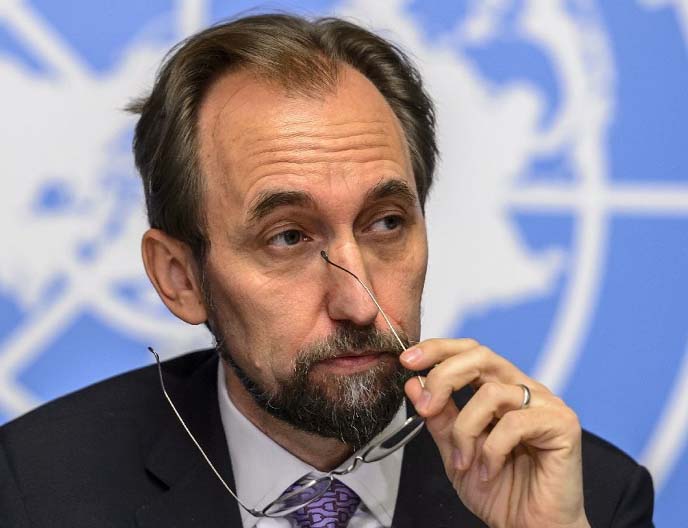
AP, Geneva :
The office of the U.N. human rights chief is decrying “insufficient gun control” in the United States and urging its leaders “to live up to its obligations to protect its citizens.”
In the wake of a gunman’s deadly attack on a Florida nightclub, Zeid Ra’ad al-Hussein criticized “irresponsible pro-gun propaganda” in the U.S. claiming that firearms make society safer, “when all evidence points to the contrary.” He questioned the ease with which people in the U.S. can obtain firearms and assault weapons like one used in Sunday’s attack
Citing a U.N. report on firearms in April, Zeid pointed to examples of how control of firearms in many countries led to a “dramatic reduction in violent crime.”
Office spokesman Rupert Colville told reporters Tuesday in Geneva: “The problem is the guns.”
Meanwhile, the people of Orlando, Fla., have sent an important message to Islamic State after a young shooter, Omar Mateen, killed or injured more than 100 in a nightclub in the name of the extremist group. By the thousands, citizens have held vigils, gathered to pray, donated blood, and taken other actions in an outpouring of affection and comfort. They, along with many Americans, are discussing different reforms that might prevent more mass killings by disturbed individuals based on hate or terror.
The city, in other words, rallied to fill the empty darkness of a tragedy inspired by a group that is known for little else except violence and what it opposes.
Orlando’s counternarrative of hope should serve as an example of what is still needed on a larger scale in the Middle East to bring about the crumbling of Islamic State’s so-called caliphate. Since it took over parts of Syria and Iraq in 2014, the radical group has been losing followers. It is struggling to win recruits from abroad as word spreads about the hardships of life under its rule. And an American-led coalition of nations has reduced the flow of money to IS and taken back nearly half its territory with drones and military advances.
“I think we’ve begun to undermine the [IS] narrative,” Marine Gen. Joseph Dunford, chairman of the US Joint Chiefs of Staff, recently told Congress.
A year ago, the group’s leader, who goes by the name Abu Bakr al-Baghdadi, called for jihad worldwide, especially in the West. This was seen as a sign that the caliphate is faltering under its internal contradictions, especially corruption and unequal rule of law. The killings in Orlando, like similar ones elsewhere in the United States and in Europe either inspired or directed by IS, are really a sign of the group’s possible collapse.
What’s needed now is progress in peace and good governance in both Syria and Iraq. Sunni and Shiite leaders in Iraq must reconcile and form a government of national unity. Pro-democracy forces in Syria should coalesce behind peace talks and on the battlefield.
The office of the U.N. human rights chief is decrying “insufficient gun control” in the United States and urging its leaders “to live up to its obligations to protect its citizens.”
In the wake of a gunman’s deadly attack on a Florida nightclub, Zeid Ra’ad al-Hussein criticized “irresponsible pro-gun propaganda” in the U.S. claiming that firearms make society safer, “when all evidence points to the contrary.” He questioned the ease with which people in the U.S. can obtain firearms and assault weapons like one used in Sunday’s attack
Citing a U.N. report on firearms in April, Zeid pointed to examples of how control of firearms in many countries led to a “dramatic reduction in violent crime.”
Office spokesman Rupert Colville told reporters Tuesday in Geneva: “The problem is the guns.”
Meanwhile, the people of Orlando, Fla., have sent an important message to Islamic State after a young shooter, Omar Mateen, killed or injured more than 100 in a nightclub in the name of the extremist group. By the thousands, citizens have held vigils, gathered to pray, donated blood, and taken other actions in an outpouring of affection and comfort. They, along with many Americans, are discussing different reforms that might prevent more mass killings by disturbed individuals based on hate or terror.
The city, in other words, rallied to fill the empty darkness of a tragedy inspired by a group that is known for little else except violence and what it opposes.
Orlando’s counternarrative of hope should serve as an example of what is still needed on a larger scale in the Middle East to bring about the crumbling of Islamic State’s so-called caliphate. Since it took over parts of Syria and Iraq in 2014, the radical group has been losing followers. It is struggling to win recruits from abroad as word spreads about the hardships of life under its rule. And an American-led coalition of nations has reduced the flow of money to IS and taken back nearly half its territory with drones and military advances.
“I think we’ve begun to undermine the [IS] narrative,” Marine Gen. Joseph Dunford, chairman of the US Joint Chiefs of Staff, recently told Congress.
A year ago, the group’s leader, who goes by the name Abu Bakr al-Baghdadi, called for jihad worldwide, especially in the West. This was seen as a sign that the caliphate is faltering under its internal contradictions, especially corruption and unequal rule of law. The killings in Orlando, like similar ones elsewhere in the United States and in Europe either inspired or directed by IS, are really a sign of the group’s possible collapse.
What’s needed now is progress in peace and good governance in both Syria and Iraq. Sunni and Shiite leaders in Iraq must reconcile and form a government of national unity. Pro-democracy forces in Syria should coalesce behind peace talks and on the battlefield.

